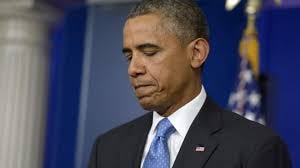What President Obama Left Out of His Talk on Race

Six days after the trial of George Zimmerman ended, President Obama talked to America about why the not guilty verdict caused so much hurt and pain and frustration among black people, especially young black men who are often viewed with suspicion, just as Trayvon Martin was.
He spoke informally, from notes, not from a teleprompter. And he spoke in personal terms, as a black man who has also experienced the humiliation of being taken for someone up to no good. He said that, “Trayvon Martin could have been me 35 years ago.”
He talked about how young black men are followed when they walk into a store. He said he was. He talked about how people lock their car doors when young black men come into view. He said it happened to him before he became a U.S. senator. He talked about how women in elevators clutch their purses when a young black man enters.
It must be frustrating when this happens to good, decent African Americans who have no intention to do anything wrong. It must be hurtful. And it also must look like racism. But looks, as we know, can be deceiving.
The president examined humiliation through the eyes of black Americans. What the president did not do is examine these humiliations from the view of the wary shop owner, or the frightened people in the car, or the suspicious woman on the elevator. What they all know is that young black men commit a disproportionate amount of crime in this country. That’s why they’re suspicious of African American males of a certain age. Black people know this too, since they’re the ones most likely to be victimized by young black men.
It’s worth repeating Jesse Jackson’s observation of some years back about race. “There is nothing more painful to me at this stage in my life than to walk down the street and hear footsteps then turn around and see somebody white and feel relieved.”
Is Jesse Jackson a racist?
The Rev. Jackson knows, as we all do, about the problems of crime committed by young black men. President Obama could have said more than he did -- that African Americans are disproportionately victims as well as perpetrators of violence. While that's true, it doesn't go far enough. It would have helped if he had explained to black Americans who were hurt by the not guilty verdict that many white people look upon young black men with suspicion for a reason. And the reason usually isn't racism. It's reality. It would have helped if he talked about dysfunction in too much of black America and what black young men need to do to change how people view them.
In 1961, Martin Luther King Jr. spoke to a congregation in St. Louis. He challenged his black audience in a way that few black leaders, including President Obama, do today.
“Do you know that Negroes are 10 percent of the population of St. Louis and are responsible for 58 percent of its crimes?” he told a congregation. “We’ve got to face that. And we’ve got to do something about our moral standards.”
He also said that, “We know that there are many things wrong in the white world, but there are many things wrong in the black world, too. We can’t keep on blaming the white man. There are things we must do for ourselves.”
If you’ve been listening to civil rights leaders, black intellectuals and more than a few white liberals since the not guilty verdict came in, you might think that the biggest problem facing black men in America is white guys with guns. This would be laughable were it not pathetic.
The biggest problem in black America is that babies are born without fathers (more than 70 percent) and that black kids drop out of high school in epidemic numbers (more than 50 percent in some big cities). These kids might come out okay, but the odds are against them. And too many of them wind up without jobs, in poverty, and sooner or later in prison.
No one is saying that raw racism is dead and buried. In a country of more than 300 million people that's expecting too much. But white racism in 2013 is the least of the problems facing black America. Imagine if President Obama had said that. Imagine if the president would just take a fraction of the time he spends talking about renewable energy and the supposed great things that will come from ObamaCare, and use that precious time instead to echo the words of Martin Luther King. If he did that all Americans would be the better for it – especially young African American men.


